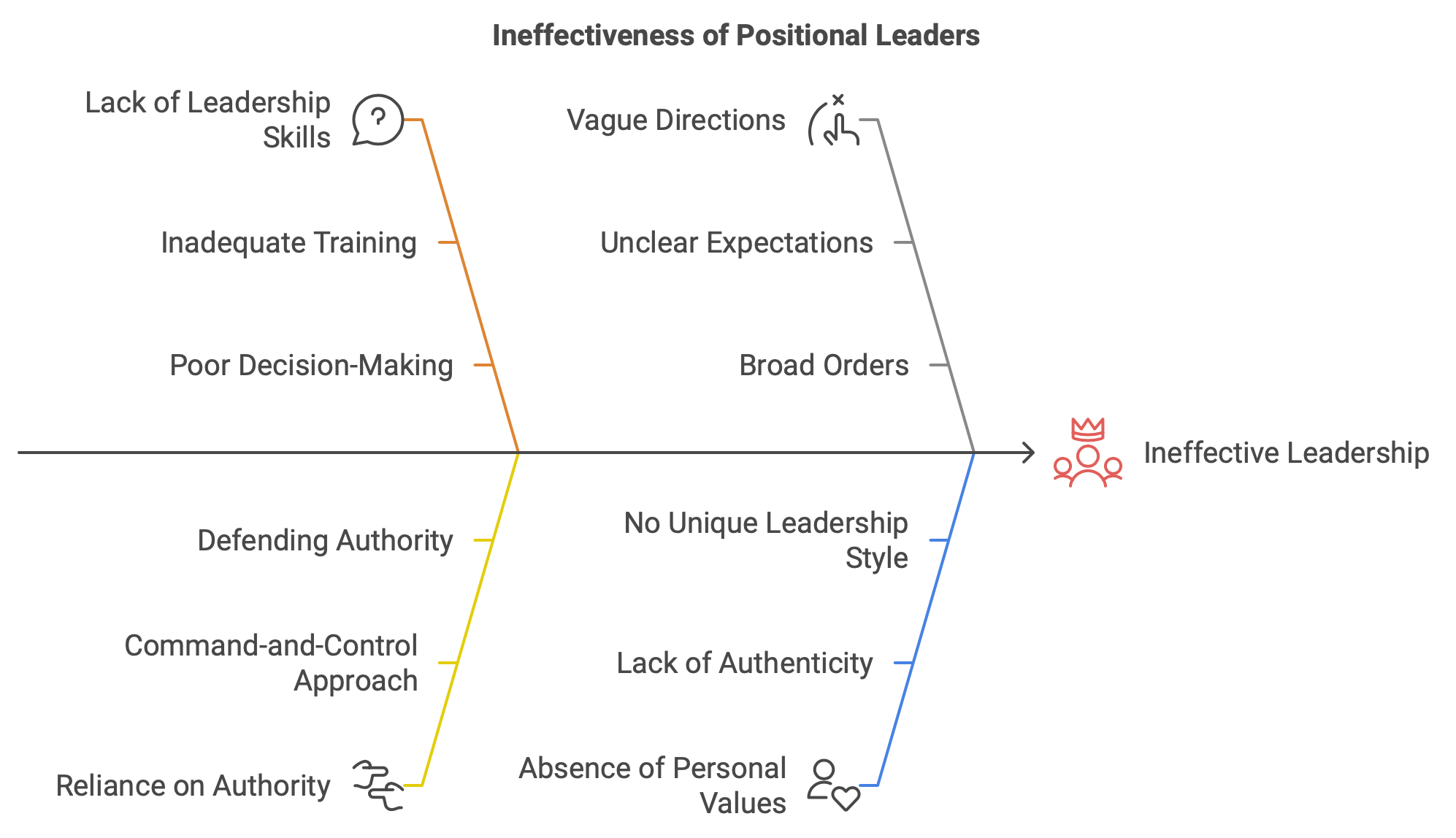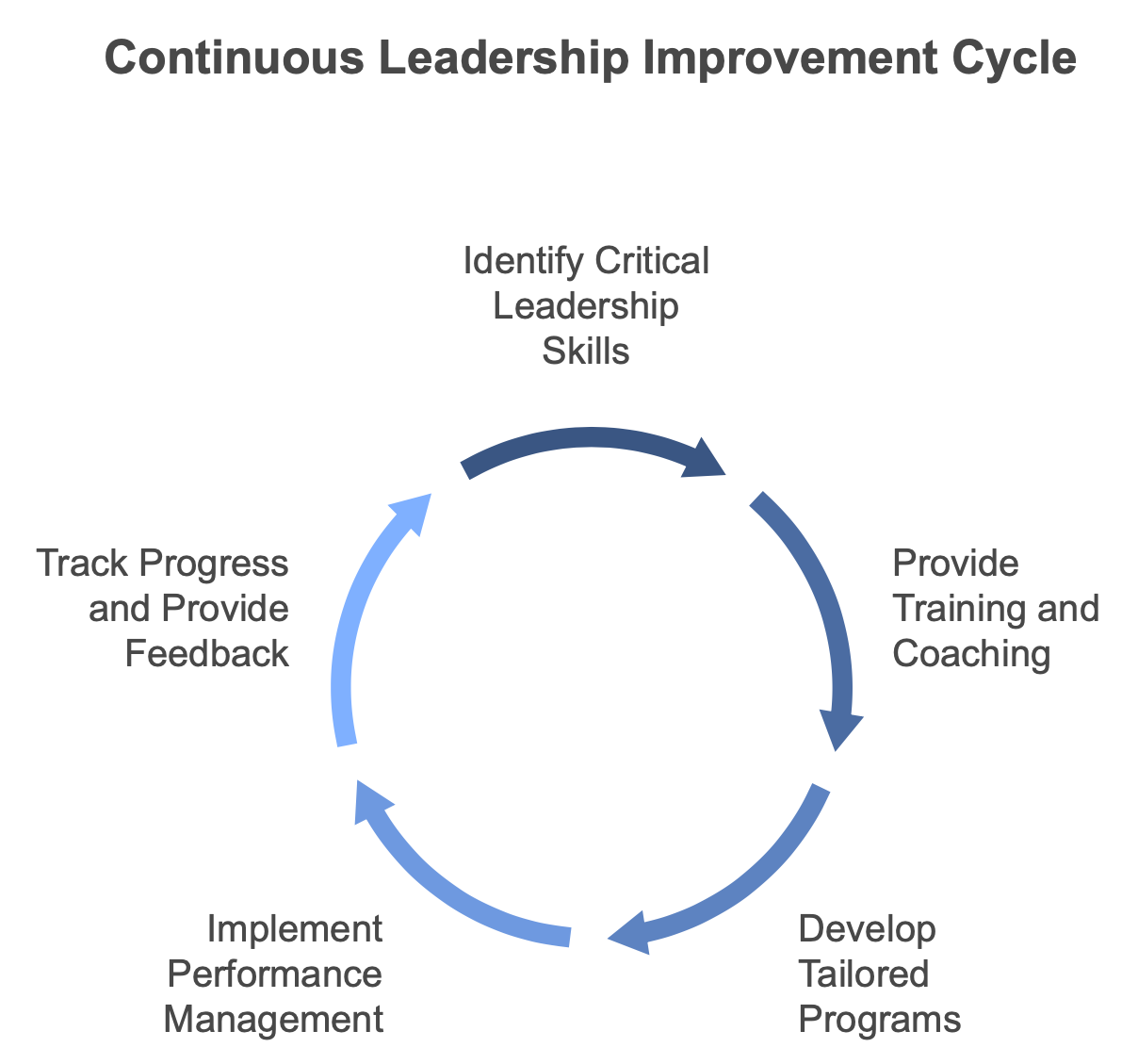What is being a position leader and how to gain trust for leading people
Be More Than Your Position: Bring Your Personality and Values to Your Leadership Role to Inspire Others.
Have you ever worked for a boss who had a high-ranking position but lacked leadership skills and / or knowledge of the subject he leads a team? This type of leader is known as a positional leader and is at level one of the leadership ladder. They believe that their formal position gives them the power to command.
Unfortunately, positional leaders waste energy and fail to bring out the best in their team members. When formal position is the only thing that legitimises leadership, much time is spent defending authority. It's like a medieval ruler obsessed with accumulating an army and castles to bolster their power.
Furthermore, positional leaders struggle to provide a concrete direction to their employees. They may issue orders, but subordinates will only do what is specifically expected, and very little more. In many cases those orders will be vague or broad, difficult to understand the details and execute as expected because they are unclear. You as a leader must be specific and know what result or outcome you expect from your employees.
Key thing is that a leadership position should be viewed as a starting point rather than the end goal. It's an opportunity to develop a unique leadership style that aligns with your values and creates lasting influence.
Consider this: although you may have a designated position within the company, you must infuse it with your personality and values by implementing specific working practices. Ultimately, you can cultivate any leadership style that is effective and authentic to who you are.
Furthermore, positional leaders struggle to provide a concrete direction to their employees. They may issue orders, but subordinates will only do what is specifically expected, and very little more. In many cases those orders will be vague or broad, difficult to understand the details and execute as expected because they are unclear. You as a leader must be specific and know what result or outcome you expect from your employees.
Key thing is that a leadership position should be viewed as a starting point rather than the end goal. It's an opportunity to develop a unique leadership style that aligns with your values and creates lasting influence.
Consider this: although you may have a designated position within the company, you must infuse it with your personality and values by implementing specific working practices. Ultimately, you can cultivate any leadership style that is effective and authentic to who you are.

The leaders must bring their own personality and values to the position to be truly effective
To be an effective leader, you must gain people's trust and build positive relationships with them. As we've seen, leaders who focus solely on their position waste energy and fail to connect with their subordinates. Instead, you should shift your attention outward and value those around you.
Positive relationships benefit both parties by raising energy levels and creating an enjoyable workplace. Conversely, negative relationships can drain energy and lead to a negative outlook. So, how do you build positive relationships? By getting people's permission to lead them, which is the next step on the leadership ladder.
To achieve this, you must value the people around you and communicate with them positively. Aggressive communication can lead to a defensive response, while calm communication encourages openness and connection. When people trust and appreciate you, they implicitly give you permission to lead them.
How to gain such a permission?
I would like to mention two aspects: First one is a trust is particularly important during difficult situations, and leaders who value everyone on the team can strengthen those ties. For example, the U.S. Marines leave no one behind, regardless of rank. Officers waive their insignias of rank to signal that they are in this together, and this ethos plays a key role in the organisation's reputation.
And the second one by inspiring others, showing examples of how to and generating momentum. Even though change can be challenging, it's essential to set an example and create a positive wave of energy. Your attitude and behaviour will influence the performance of your team, so it's crucial to show enthusiasm and drive.
Positive relationships benefit both parties by raising energy levels and creating an enjoyable workplace. Conversely, negative relationships can drain energy and lead to a negative outlook. So, how do you build positive relationships? By getting people's permission to lead them, which is the next step on the leadership ladder.
To achieve this, you must value the people around you and communicate with them positively. Aggressive communication can lead to a defensive response, while calm communication encourages openness and connection. When people trust and appreciate you, they implicitly give you permission to lead them.
How to gain such a permission?
I would like to mention two aspects: First one is a trust is particularly important during difficult situations, and leaders who value everyone on the team can strengthen those ties. For example, the U.S. Marines leave no one behind, regardless of rank. Officers waive their insignias of rank to signal that they are in this together, and this ethos plays a key role in the organisation's reputation.
And the second one by inspiring others, showing examples of how to and generating momentum. Even though change can be challenging, it's essential to set an example and create a positive wave of energy. Your attitude and behaviour will influence the performance of your team, so it's crucial to show enthusiasm and drive.
Developing your people is vital for the success of your company

True leaders act as mentors, focusing on transforming those around them and helping them grow. People development is therefore one of the most critical aspects of leadership, with transformative leaders dedicating 80% of their efforts to staff development and just 20% to personal productivity. Maybe 70% and 30%, but you notice the priorities.
Not only is personal development beneficial for the company, but it also fulfils a significant human need. By offering opportunities for growth, employees feel loyal to the company, reducing the likelihood of seeking opportunities elsewhere.
To achieve long-term success, finding the right balance between teaching and empowering employees to grow on their own is essential.
Creating a culture of leadership and developing future leaders is the ultimate goal of effective leadership. While becoming a successful leader is a lifelong journey, the true mark of a great leader is their ability to teach and empower others to become leaders as well.
Empowering others to become leaders and seeing them grow and follow in one's footsteps is immensely fulfilling, making it the ultimate source of personal satisfaction.
I recommend you to read related articles:
Implementing KPIs Without Losing Your Team’s Trust and Motivation
Empowering Employees Through Learning: How Skill Development Drives Loyalty and Retention
The Missing Ingredient in Team Success: Discover How Enthusiasm Changes Everything
How UnitiQ Expertise in Leadership can help
UnitiQ as experienced HR services company can help to improve leadership in several ways.
Firstly, they can assist in identifying the leadership skills that are most critical to the company's success and then provide leadership training and coaching to the current and potential leaders in the organization. By working with us, leaders can develop their leadership skills, build positive relationships with their subordinates, and create a culture of leadership within the organization.
Additionally, we can help to develop and implement leadership development programs that are tailored to the unique needs of the organization. These programs can focus on specific skills, such as communication or decision-making, and can be delivered through workshops, coaching, or other forms of training.
UnitiQ can also assist in creating a performance management system that rewards effective leadership and provides feedback on areas for improvement. This system can help leaders to track their progress, identify their strengths and weaknesses, and receive ongoing support to continually improve their leadership skills.
In summary, we can play a vital role in helping organizations to improve their leadership by providing training and coaching to current and potential leaders, developing leadership development programs, and creating a performance management system that rewards effective leadership.
Contact me, Olga Fedoseeva, Fonder at UnitiQ, directly:
My Telegram
My LinkedIn
Firstly, they can assist in identifying the leadership skills that are most critical to the company's success and then provide leadership training and coaching to the current and potential leaders in the organization. By working with us, leaders can develop their leadership skills, build positive relationships with their subordinates, and create a culture of leadership within the organization.
Additionally, we can help to develop and implement leadership development programs that are tailored to the unique needs of the organization. These programs can focus on specific skills, such as communication or decision-making, and can be delivered through workshops, coaching, or other forms of training.
UnitiQ can also assist in creating a performance management system that rewards effective leadership and provides feedback on areas for improvement. This system can help leaders to track their progress, identify their strengths and weaknesses, and receive ongoing support to continually improve their leadership skills.
In summary, we can play a vital role in helping organizations to improve their leadership by providing training and coaching to current and potential leaders, developing leadership development programs, and creating a performance management system that rewards effective leadership.
Contact me, Olga Fedoseeva, Fonder at UnitiQ, directly:
My Telegram
My LinkedIn

